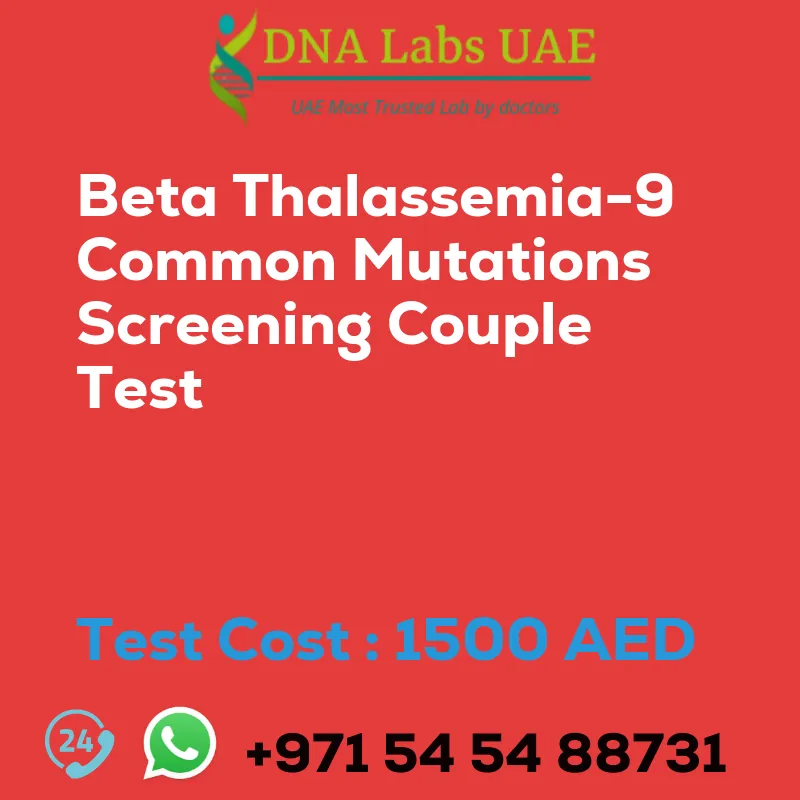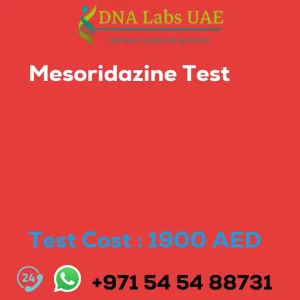Beta Thalassemia-9 Common Mutations screening Couple Test
Test Name: Beta Thalassemia-9 Common Mutations screening Couple Test
Components: EDTA Vacutainer (2ml)
Price: 1500.0 AED
Sample Condition: Peripheral blood
Report Delivery: 3-4 days
Method: End Point PCR
Test type: Genetics
Doctor: General Physician
Test Department:
Pre Test Information: Beta Thalassemia-9 Common Mutations screening (Couple) can be done with a Doctor’s prescription. Prescription is not applicable for surgery and pregnancy cases or people planning to travel abroad.
Test Details
Beta thalassemia is a genetic disorder characterized by reduced or absent production of hemoglobin, which can lead to anemia. There are several common mutations associated with beta thalassemia, and screening for these mutations is important, especially for couples planning to have children. The nine common mutations screened for in beta thalassemia are:
- IVS1-1 (G>A): This mutation affects the splicing of the beta-globin gene, leading to reduced or absent production of beta-globin.
- IVS1-5 (G>C): This mutation also affects splicing and leads to reduced beta-globin production.
- IVS1-6 (T>C): Another splicing mutation that results in reduced beta-globin production.
- IVS1-110 (G>A): This mutation affects splicing and leads to reduced beta-globin production.
- Codon 8 (-AA): This mutation results in the deletion of two amino acids (alanine and alanine) in the beta-globin protein, causing a severe form of beta thalassemia.
- Codon 8 (-AA): This mutation leads to the deletion of three amino acids (glycine, alanine, and valine) in the beta-globin protein, causing a severe form of beta thalassemia.
- Codon 17 (A>T): This mutation results in the substitution of a threonine amino acid with a serine amino acid in the beta-globin protein, causing a mild form of beta thalassemia.
- Codon 26 (G>A): This mutation leads to the substitution of a valine amino acid with an alanine amino acid in the beta-globin protein, causing a mild form of beta thalassemia.
- Codon 39 (C>T): This mutation results in the substitution of a glutamine amino acid with a stop codon in the beta-globin protein, causing a severe form of beta thalassemia.
Screening for these common mutations in both partners of a couple can help determine the risk of having a child with beta thalassemia. If both partners carry mutations in the same gene, there is a higher chance of having a child with the disorder. Genetic counseling and prenatal testing options can be discussed with a healthcare provider to make informed decisions about family planning.
| Test Name | Beta Thalassemia-9 Common Mutations screening Couple Test |
|---|---|
| Components | EDTA Vacutainer (2ml) |
| Price | 1500.0 AED |
| Sample Condition | Peripheral blood |
| Report Delivery | 3-4 days |
| Method | End Point PCR |
| Test type | Genetics |
| Doctor | General Physician |
| Test Department: | |
| Pre Test Information | Beta Thalassemia-9 Common Mutations screening (Couple) can be done with a Doctors prescription. Prescription is not applicable for surgery and pregnancy cases or people planing to travel abroad. |
| Test Details |
Beta thalassemia is a genetic disorder characterized by reduced or absent production of hemoglobin, which can lead to anemia. There are several common mutations associated with beta thalassemia, and screening for these mutations is important, especially for couples planning to have children. The nine common mutations screened for in beta thalassemia are: 1. IVS1-1 (G>A): This mutation affects the splicing of the beta-globin gene, leading to reduced or absent production of beta-globin. 2. IVS1-5 (G>C): This mutation also affects splicing and leads to reduced beta-globin production. 3. IVS1-6 (T>C): Another splicing mutation that results in reduced beta-globin production. 4. IVS1-110 (G>A): This mutation affects splicing and leads to reduced beta-globin production. 5. Codon 8 (-AA): This mutation results in the deletion of two amino acids (alanine and alanine) in the beta-globin protein, causing a severe form of beta thalassemia. 6. Codon 8 (-AA): This mutation leads to the deletion of three amino acids (glycine, alanine, and valine) in the beta-globin protein, causing a severe form of beta thalassemia. 7. Codon 17 (A>T): This mutation results in the substitution of a threonine amino acid with a serine amino acid in the beta-globin protein, causing a mild form of beta thalassemia. 8. Codon 26 (G>A): This mutation leads to the substitution of a valine amino acid with an alanine amino acid in the beta-globin protein, causing a mild form of beta thalassemia. 9. Codon 39 (C>T): This mutation results in the substitution of a glutamine amino acid with a stop codon in the beta-globin protein, causing a severe form of beta thalassemia. Screening for these common mutations in both partners of a couple can help determine the risk of having a child with beta thalassemia. If both partners carry mutations in the same gene, there is a higher chance of having a child with the disorder. Genetic counseling and prenatal testing options can be discussed with a healthcare provider to make informed decisions about family planning. |







